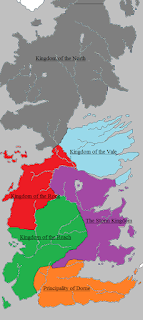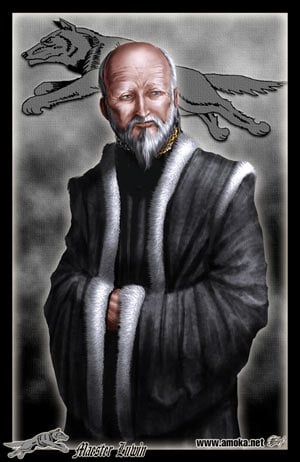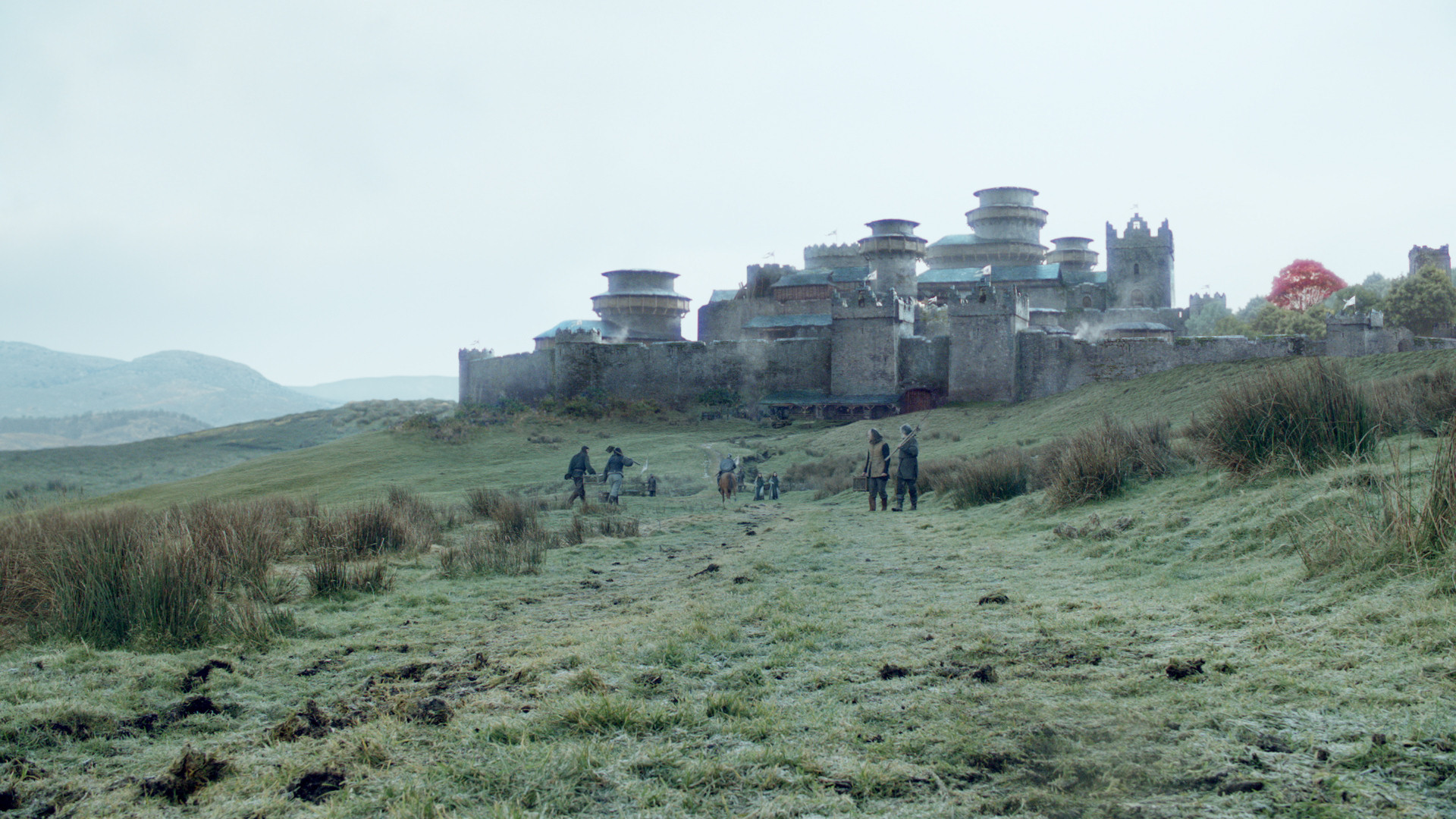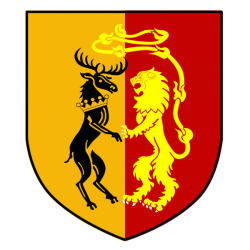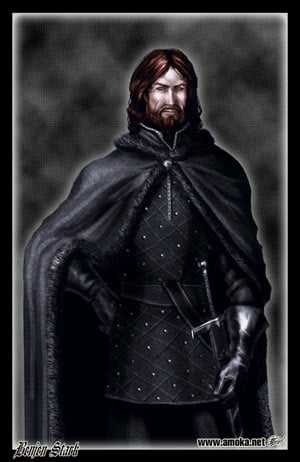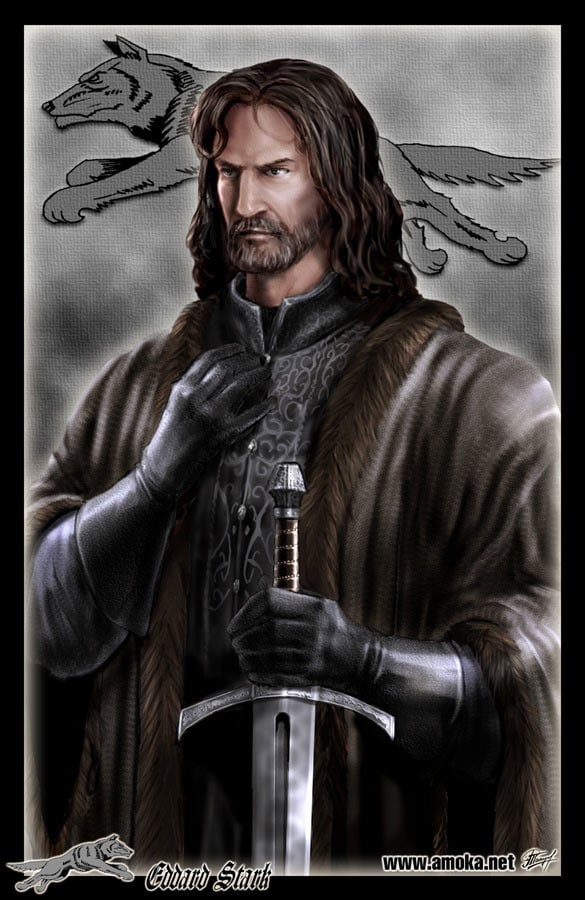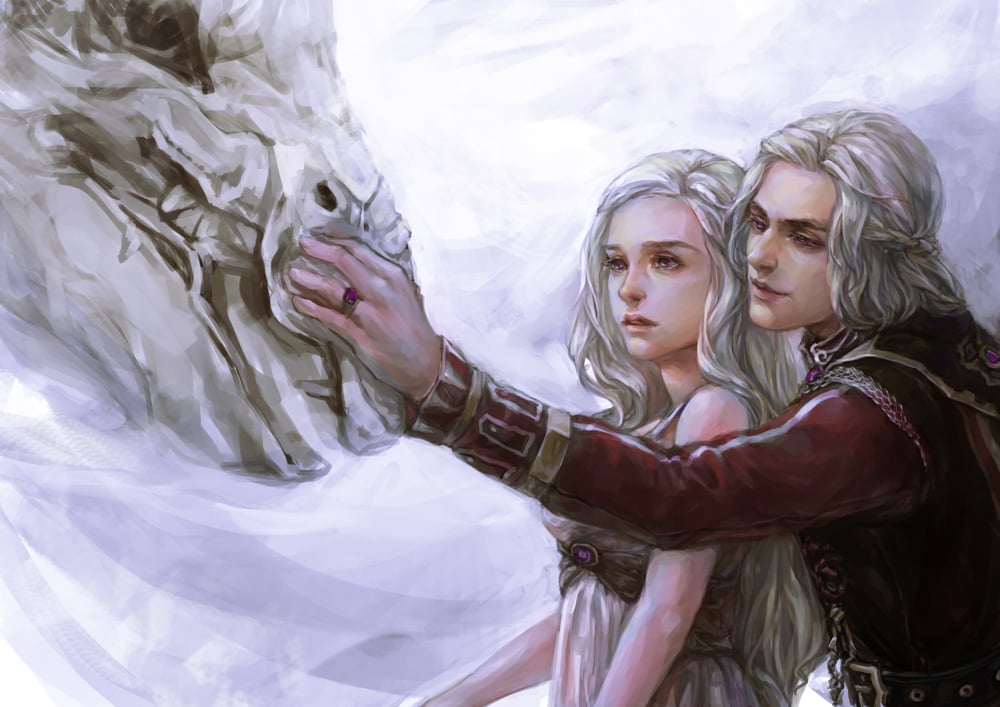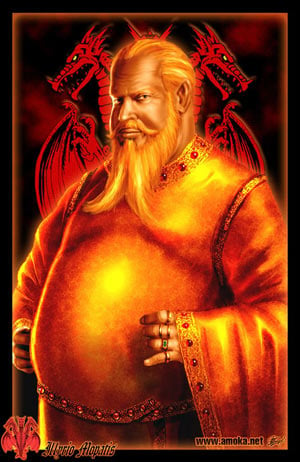In the original pitch for this series, Martin declared he was going to be writing a trilogy for a A Song of Ice and Fire, and we know how well that turned out. He did fairly rapidly complete the first three installments between 1996, 1998 and 2000, with a five year gap between ASOS and A Feast for Crows, a six year gap between it and A Dance With Dragons and a ???? gap between it and The Winds of Winter. The issues with A Feast for Crows and A Dance with Dragons I intend to address later, after my mammoth reread of A Feast with Dragons. For now though, I'm going to examine the first 'trilogy' as it were.
Having been completed within only two years of each other, the first three books do end up feeling very tightly paced. The same characters are almost omnipresent in each novel (save for the introduction of new view points later in ACOK and ASOS) but each adds more to the plot than they might detract. Overall the same characters telling the same story. ASOS is where this begins to diverge, but not as much as you might think.
Going forward I want to express that yes these aren't a perfect trilogy, there are too many loose ends, but I do think that the narrative is concise and well plotted directly to the end. It ends the first 'arc' of the series if you will.
To begin with, we have the grand opening to the series which is masterfully crafted at Winterfell in AGOT. We are, after the fabulous prologue, introduced seriatim to the major point of view characters, establishing important relationships, the setting, and the interplay between the plots in Westeros in Essos in a very compact and even handed manner. With the exception of the introduction of Davos and Theon in ACOK which counterbalances the loss of Ned's POV, we don't have many new viewpoint characters until Sam and Jaime counterbalances the loss of Catelyn in ASOS and Theon disappears from the story until ADWD.
Between these three books there's some remarkable continuity in both the scope of the plot and the range of the characters. Dany, for instance, is our only voice on Essos until well into AFFC or ADWD, and carries that portion of the story from Pentos to Slavers Bay when people begin to drop off Westeros in drips and drabs. Then in Westeros itself we have a stable cast of characters until the end of ASOS. They, broadly speaking, tell the story of the War of the Five Kings from top to bottom, until it can be said to peter out by the end of ASOS.
In miniature it can be said that this trilogy tells the tale of the Northern War for Independence, the Rise of House Lannister, the war between the Night's Watch and the Wildlings, with the creeping threat of the Others ever present, and the rise of The Prince That Was Promised. These four threads are both, directly in the narrative and then in the background, sprinkled throughout with background characters and other relationships between them. Selmy in the first book to his appearance with Dany on Qarth being an example of a character who provides important background plot advancement. Varys being the ultimate example of that.
To argue specifically for each of these overarching plots:
The War for Northern Independence (itself a sub plot of the War of the Five Kings) is set off by the execution of Ned Stark by Joffery. This causes a sudden shift in Northern war aims, and Rob Stark is crowned king. This is what ends AGOT and picks up in the next two installments, with Rob's battles and campaigns coming to the forefront or the background across the next two installments. These all culminate in the Red Wedding half way through ASOS, where the king is dead and we discover Roose Bolton is to become Warden of the North and supplant House Stark. Now there's the outliers like the sieges of Riverrun and Raventree Hall, but even Tywin rightly points out that with so many highborn hostages, it's all over but the kneeling. So this is one plot that comes to a dark but satisfying conclusion in ASOS, but which leads into one of the other plots which I'll address in a moment.
This second plot thread is about the Rise of House Lannister. This one is, I admit, a bit more nebulous, but it is conveyed through the eyes of Tyrion and Sansa (and to me this has a nice bit of imagery with their forced wedding) as we see in the background Tywin making very profitable marriages. Whether it was the pre-series marriage of Cersei to Robert, or the gaining of lands by marrying Tyrek to Ermesande Hayford or the awarding of Lacel Lannister the lands of the extinct House Darry, these are all small steps. Each is a small move to take a bite out of one portion of Westeros and put down Lannister roots to establish Lannister rule. This continues with Joffery and then Tommen's marriage to Margery Tyrell, and with Tywin's plans to marry Cersei off to someone. Arguably it reaches its apogee just after the Purple Wedding, only for the set up to come crashing down when Tyrion shoots Tywin with a crossbow and Cersei attempts to take charge.
The war between the Night's Watch and the Wildlings is pretty self-explanatory I think. Just to recap, the events of AGOT directly set up Mance Rayder's attack on the Wall in ASOS and in so doing sowed the seeds for the end of that direct military conflict, but not the peace, which is one of those dangling plot threads left over for later.
Finally we have the rise of the Prince That Was Promised with Dany. Her whole arc is in many ways, messianic. From braving the flames to her dragons hatching with a cosmic portent overhead in AGOT, braving the desert and then the temptation of devils in Qarth in ACOK, to finally accepting her role as a queen in ASOS but perhaps refusing the call, when she decides to settle down in Mereen. This one is, aside from Bran's arc, one of the most magical in the whole series, with dragons, warlocks, wizards, and quests galore. She goes from being a beggar, to having the only living dragons in the known world. Added to that the not unreasonable speculation she is that promised "prince" with her 'birthing' the dragons in fire and blood and being a direct descendant of Aegon's line, it's not unreasonable to see these first three novels being about her acceptance of her role as a ruler before settling into the Meereenese Blot at the end of ASOS.
Like I said before, these are not perfect points, or even endings. They quite notably don't say anything for Bran, Sansa, or Arya's plot arcs. And I admitted up front that this was an imperfect analogy. However, that being said, I would argue that ASOS can be considered to wrap up these important plots and narrative arcs which directly set the stage for later events.
Some of those dangling plots are of course the emerging War in the North, the Meereenese Blot, the Three Eyed Crow and Arya and her identity, Sansa and Davos, among others. However, their stories all either have dramatic endings or set up the major narratives for later.
Sansa for instance at last escapes King's Landing. Arya leaves Westeros and begins her journey down the nebulous well of identity. Bran makes it beyond the Wall. Finally Tyrion is being set up for greater things, some of which remain a bit mysterious.
The introduction of new characters, secondary plot points, and other regional issues (like Dorne) in AFFC and ADWD may explain the frustration some readers had with those novels. It could be reasonably said that unlike these first three books, where entire narrative arcs either conclude or are set up for their next steps, these two books introduce more but end less as the reader is essentially left in limbo.
Now, because of that very limbo, I do feel that I can reasonably conclude that the first three books are a great narrative trilogy, inasmuch as they establish the next phase of the story. They have tightly plotted and well developed character and narrative arcs which drive the story forward and give us satisfying next steps for our principle cast. AGOT is our beginning, and ASOS is our end. To borrow from another series, it is not the ending, but it is an ending.
For now, it's probably the most satisfying narrative conclusion we have in this series until the final words are typed in A Dream of Spring.


